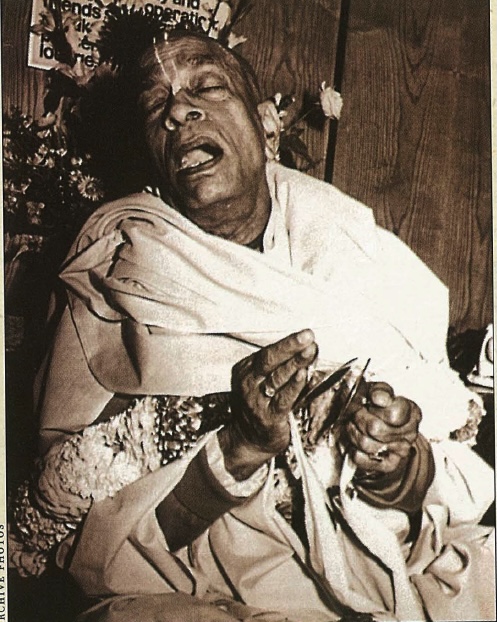There is a misconception,” wrote His Divine Grace A.C. Bhaktivedanta Swami Prabhupada in 1977 in Science of Self Realization, “that the Krishna consciousness movement represents the Hindu religion. Sometimes Indians both inside and outside of India think that we are preaching the Hindu religion, but actually we are not.” In chapter three of the book [available from Bhaktivedanta Archives, P.O. Box 255, Sandy Ridge, North Carolina 27046 USA], this startling point is made several times: “The Krishna consciousness movement has nothing to do with the Hindu religion or any system of religion…. One should clearly understand that the Krishna consciousness movement is not preaching the so-called Hindu religion.”
Followers of Srila Prabhupada have assembled all of his letters, books, lectures, interviews and conversations on the Bhaktivedanta Vedabase [also available from Bhaktivedanta Archives]. This CD-Rom database yielded 183 references to Hinduism, which were compiled and analyzed to understand Srila Prabhupada’s point of view.
Often Srila Prabhupada would simply deny the existence of a religion called “Hinduism.” He attributed the improper designation to “foreign invaders.” At other times he acknowledged the existence of the faith, but considered it a hopelessly degraded form of the original Sanatana Dharma of the Vedas. In his April, 1967, New York lectures he remarked, “Although posing as great scholars, ascetics, householders and swamis, the so-called followers of the Hindu religion are all useless, dried-up branches of the Vedic religion.” ISKCON, he believed, was the only true exponent of the Vedic faith today. In an interview given for Bhavan’s Journal on June 28, 1976, he said, “India, they have given up the real religious system, Sanatana Dharma. Fictitiously, they have accepted a hodgepodge thing which is called Hinduism. Therefore there is trouble.”
The Guru frequently explained his position, and acted upon his beliefs in establishing his dynamic society. At a 1974 Mumbai lecture, he declared, “We are not preaching Hindu religion. While registering the association, I purposely kept this name, ‘Krishna Consciousness,’ neither Hindu religion nor Christian nor Buddhist religion.”
Srila Prabhupada was aware that the Indian community had a mistaken impression of his Hinduness. In a 1970 letter to a temple administrator in Los Angeles, he wrote, “The Hindu community in the West has got some good feeling for me because superficially they are seeing that I am spreading Hindu religion, but factually this Krishna Consciousness movement is neither Hindu religion nor any other religion.” That remains the case today, for Srila Prabhupada left no successor with the authority to change his spiritual edicts.
So why does the general Hindu community mistakenly believe that ISKCON is a Hindu organization, when it never describes itself as such? Well, it sometimes does. During the recent ISKCON temple openings in New Delhi and Bangalore, where newspaper reports frequently identified the grand temples as Hindu, the ISKCON press releases, such as that of April 15, 1998, never used the H word. Yet, when Indian devotees serving at each of those temples were asked in late July by journalists for this article, they said it is a Hindu temple. The discrepancy between public perception and internal policy is further confused by the group’s official exceptions to the non-Hindu position. Faced with difficulties, ISKCON leaders have appealed to the Hindu community to back them up, as in a dispute over the Bhaktivedanta Manor in the UK or when being hassled by Christians in Russia and Poland. In appeals to judges and governments, the word Hindu is openly used. In other legal cases, including one to the US Supreme Court, ISKCON has attempted to counteract the “cult” label by claiming to be a traditional Hindu lineage, and asked other Hindus to affirm this in the courts. Other organizations who parted company with Hinduism, such as Transcendental Meditation and Brahma Kumaris, do not compromise their position under any circumstances.
What also sets ISKCON apart is its open repudiation and criticism of Hinduism, especially among members. There are reports of Hindus who joined ISKCON only to be taught to reject their family’s religion. “Previously we were Hindus. Now we are Hare Krishnas,” some said. At the same time, the organization often appeals to the Hindu community and businessmen for financial support of its social programs and political help to protect ISKCON from detractors.
Considering ISKCON’s appearances–member’s dress, names, bhajana, festivals, worship, scripture, pilgrimage, temple building, and so forth–it’s little wonder that so many have assumed they are Hindus. To find out they are not will certainly surprise many–Hindus and non-Hindus alike. It may even surprise a few Hare Krishnas themselves.


